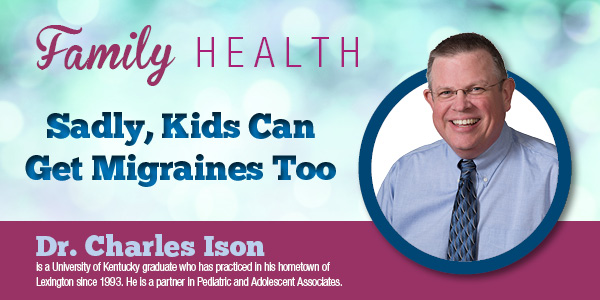Sadly, Kids Can Get Migraines Too
Children can have migraines. Even infants and toddlers can supposedly get them, though diagnosing them is understandably difficult.
About 8% of children are thought to suffer with them. They are a special class of headaches with some unique features.
Scientists are trying to figure out what causes migraines. It is thought that they arise from an imbalance in brain chemicals, such as too little of the neurotransmitter serotonin being produced in part of the brainstem.
The trigeminal nerve, which is the major nerve dealing with pain regulation in the head and comes off the brainstem, is thought to be a culprit.
It could also be a problem with the regulation of blood vessels in the head.
Migraine symptoms can include a throbbing, pounding frontal headache. In adolescents and adults, this will often just be on one side of the forehead.
There can be nausea, vomiting, and a lot more abdominal pain than adults typically have. Extreme light and sound sensitivity can also occur.
Migraines in children usually last at least an hour but rarely continue for at least four hours as is typical for adults.
Children can get prodromes with migraines just like adults sometimes do. These are episodes of visual phenomena that occur before the headache starts.
They can consist of bright spots, zig-zagging lines, flashing lights and partial loss of visual fields. About 30% of migraine sufferers will have a prodrome.
Migraines can be treated with acetaminophen or ibuprofen. If this does not work, there are multiple prescribed medications that can be used depending on the age of the child.
Preventive medications for migraines include antihistamines (cyproheptadine), blood pressure medicines (propranolol), anti-seizure medicines (topiramate) and antidepressants (amitriptyline).
Certain other preparations are currently being studied for use in children. Cognitive behavioral therapy may also help prevent them.
What can trigger migraines? Stress, changes in sleep habits, caffeine, alcohol, certain foods, bright lights, even hormone fluctuations in menstrual cycles can all potentially do this.
Migraines are no fun. I started having them in adulthood, but I can remember as a child how sick my dad would get with them. We do know that they tend to be heavily genetic, so children with migraines often have at least one close relative who also has them.
Recognizing which children suffer from migraines can be a good first step toward getting them the treatment they need.

